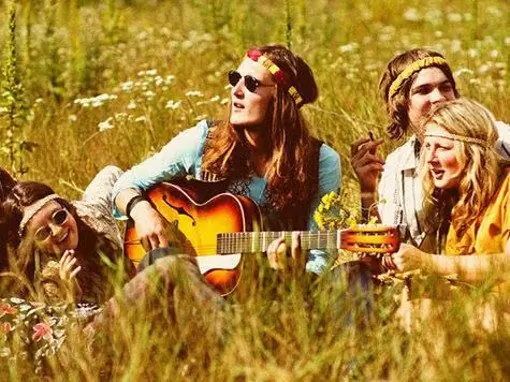- Author Antonio Harrison harrison@cultureoeuvre.com.
- Public 2023-12-16 07:44.
- Last modified 2025-01-22 21:44.
The hippie movement emerged in America in the mid-60s, when the United States was fighting the Vietnam War. It was this war that provoked an increase in discontent, which resulted in a kind of peaceful protest.

Views and beliefs
The basis of the hippie views was pacifism, initially directed against the Vietnam War. Then pacifism spread to other areas of life. Pacifism means rejection of violence, condemnation of hostilities.
Representatives of this subculture denied rules imposed by social institutions, various formalities and hierarchy.
Hippies were of the opinion that, first of all, changes should occur in the consciousness of a person, and not in the structure of society. They extolled spiritual values and self-development.
The hippie symbol is a flower, hence their name "flower children". They believed that civilization had reached a dead end in its development. The only option may be to reunite with nature, enjoy the beauty of the natural world.
This point of view ultimately led to a number of negative consequences. Hippies abused psychoactive substances and alcohol, led a promiscuous sex life. The massive spread of hippie culture provoked a sexual revolution in the world.
The appearance of a hippie had its own characteristics. Both sexes wore long hair that was woven into flowers. They preferred loose-fitting clothing, variegated colors, many baubles and adornments.
Hippie hobbies
The desire for freedom led to the fact that hippies did not have a permanent place of residence, work, and were not enrolled in educational institutions. They often spent their time meditating, traveling. Much attention and time was devoted to creativity and self-realization, while the individual way of self-expression of each person was appreciated and respected.
Representatives of this subculture often got together and spent time in an atmosphere of relaxed chaos. At the same time, individuals or groups of people could indulge in different activities. They listened to music, danced, talked.
Of course, such gatherings were not complete without the use of drugs. In an effort to get to know the world better, young people artificially expanded the boundaries of everyday consciousness. There were also hippie communes where drug use was banned.
In music, hippies preferred rock and roll, which was just emerging simultaneously with the subculture. Under the influence of hippies, a new direction in music appeared - psychedelic rock. Such music was intended to introduce the listener into a state of altered consciousness.
While the flowering of hippie culture is a thing of the past, some of its effects are firmly entrenched in society. For example, tolerance for racial differences, pacifism, promotion of healthy food, environmental movements, the birth of feminism. On the other hand, this movement provoked an increased interest in psychedelics, tolerance for homosexual orientation and sexual permissiveness.


